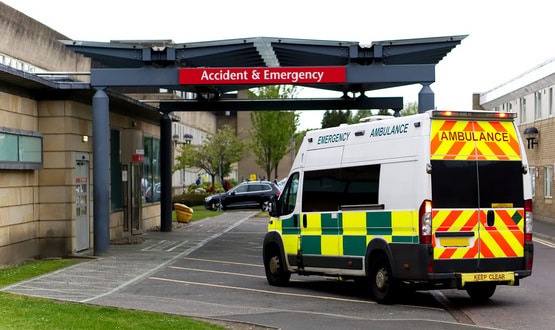System Control Centres ‘a good concept’ but challenges lie ahead
- 6 December 2022

More than 40 System Control Centres (SCCs) are now operating 24/7 across the country in a bid to ease pressures on the NHS this winter and as we move into 2023.
Director and CIO of the Yorkshire & Humber Care Record Programme, Lee Rickles, speaks exclusively to Digital Health News about SCCs, including why they are “a good concept”, the challenges that lie ahead and why the Humber and North Yorkshire region are yet to introduce one.
The purpose of SCCs is to consistently ensure the safest and highest quality of care possible for the entire population across every area by balancing the clinical risk within and across all acute, community, mental health, primary care, and social care services.
The new 24/7 centres are already live in all 42 integrated care systems (ICSs) in England, operating mostly across integrated care boards (ICB). The intention is that they will manage demand and capacity across the entire country by constantly tracking beds and attendances, taking stock of all activity and performance for the first time.
Professor Sir Stephen Powis, NHS national medical director, recently said in an NHS England press release seen by Digital Health News: “These locally delivered control centres are just one part of our wide-ranging preparations for winter but will play a vital role in the sharing and use of vital information to drive smarter decision-making by local NHS teams.
“From Maidstone to Lincoln, less than six weeks after we issued our national guidance, we have teams across England working around the clock monitoring and responding to information and insights from frontline services to help spread resources and make the best possible decisions for both staff and patients.”
SCCs are very much data-driven and led by teams of clinicians and experts, enabling rapid decisions to be made to any emerging challenges including where hospitals can benefit from mutual aid, or to divert ambulances to another nearby hospital with more capacity.
Significant steps towards this model were made during the Covid-19 pandemic and last winter, with several regions and ICBs creating operational control centres. As more and more SCCs open across the country, is the NHS heading in the right direction in terms of easing pressures?
A promising development
The emergence of SSCs across the country and the concept of them is a “good idea” according to Rickles, who likens them to air traffic control centres.
He said: “The control centres are very much based around an air traffic control centre, where you have all these aircrafts who can only have so much capacity, we’ve got to keep so many circling, we’ve got to make sure if some are getting fuelled up and that people who are going to fly in the aircraft are in the right place at the right time.”
“The principle is brilliant. I think it’s something that will really help us understand whether we are using our resources and if we are using them effectively.
“So the concept of having all the information and data there with people who can interpret and understand it and use it effectively is a good idea, but you’ve got to have a very blended team of expertise, you can’t just go with a load of ICB ex-contract managers, you’ve got to go in with the people who understand the context locally.”
NHS England revealed in an online publication dedicated to SSCs that they should be developed to deliver improved situational awareness, holistic and real-time management of capacity and performance, coordinated action and mutual aid, and improved clinical outcomes.
Despite a centre now operating in every ICS, Rickles believes that they need a bit of time to mature and fully function properly and says an ICB should not rush into setting up a centre if they aren’t ready.
He added: “Realistically, my opinion is that next year it will land properly because then you have given ICBs a bit of time to get their act together. To stand something up in a few months and for it to be effective is unlikely as you would have to make decisions on data that’s already out of date.
“The principles are great; it just needs managing and resourcing and we need a level of consistency so that each ICB and command centre is talking the same language, otherwise when we start aggregating them nationally we’re just going to end up with a hodgepodge of what do we really mean.”
Key impacts and potential hurdles
We are yet to learn the impacts that SCCs will have both in the short term and the long term on the NHS and quality of healthcare. However, Rickles believes they have the potential to be a huge help if key decisions are made correctly.
“The short-term impact is definitely being able to manage capacity and understand problems before they happen so you can react to them because you can see it happening, that’s when artificial intelligence would come in.
“In the longer term that’s when you start coming to digital twinning and how you use population health analytics, which does require quite an investment in data scientists in the NHS as we don’t have many data scientists, unfortunately.”
“We have a lot of people who do lots of pretty pictures, we don’t really have people who understand data science to the degree we need. Fundamentally, population health, health economics and that view of the world are using the same information flows and datasets that you’d use for a command centre.
“It’s just that you’re looking at the long term, especially if you can start using the same information for digital twinning and reconfiguration of service, looking at the effects of how you can use resources in the population,” he told Digital Health News.
Looking at how the NHS uses its resources and being able to make changes accordingly will inevitably lead to some challenges and potentially some unhappy groups of people, as Rickles alludes to.
“The challenge is that some of the answers [regarding resources] are not going to be answers that the public wants to hear.
“An affluent area with low health requirements will probably not want to hear we’re going to close a whole centre down that doesn’t need to be there because we’ve got major health issues in a socially deprived area,” he added.
Activity in the Yorkshire & Humber region
The Yorkshire and Humber region continues to place digital health high on its agenda, launching the latest edition of its digital health accelerator programme, Propel@YH, back in October.
In terms of whether or not a 24/7 system control centre is operating in Humber & North Yorkshire at this time, Rickles confirmed to Digital Health News that they “haven’t got one at the moment” but “there are plans”.
“We’re currently working with North of England CSU where we’re going to be feeding the real time data from the Yorkshire and Humber Shared Care Record. It’s not everything but it’s real time and it’s got good coverage.”
He added: “I would probably say the Northeast is more advanced than us, we’re probably emerging in Humber and North Yorkshire.”




